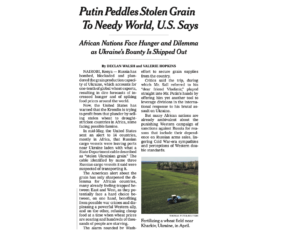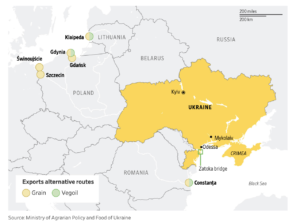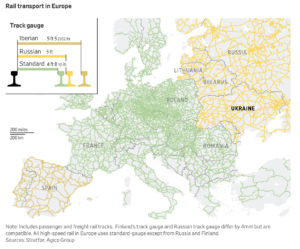President Donald Trump on Friday signed an executive order temporarily expanding the amount of beef the U.S. can import from Argentina, a move the White House says is aimed at…
Kremlin Trying to Sell “Stolen Ukrainian Grain,” as Kyiv Search For Alternative Grain Export Routes Continues
Declan Walsh and Valerie Hopkins reported on the front page of today’s New York Times that, “Russia has bombed, blockaded and plundered the grain production capacity of Ukraine, which accounts for one-tenth of global wheat exports, resulting in dire forecasts of increased hunger and of spiking food prices around the world.
Now, the United States has warned that the Kremlin is trying to profit from that plunder by selling stolen wheat to drought-stricken countries in Africa, some facing possible famine.
“In mid-May, the United States sent an alert to 14 countries, mostly in Africa, that Russian cargo vessels were leaving ports near Ukraine laden with what a State Department cable described as ‘stolen Ukrainian grain.’ The cable identified by name three Russian cargo vessels it said were suspected of transporting it.”

Today’s article indicated that, “The American alert about the grain has only sharpened the dilemma for African countries, many already feeling trapped between East and West, as they potentially face a hard choice between, on one hand, benefiting from possible war crimes and displeasing a powerful Western ally, and on the other, refusing cheap food at a time when wheat prices are soaring and hundreds of thousands of people are starving.
“The alarm sounded by Washington reinforced Ukrainian government accusations that Russia has stolen up to 500,000 tons of Ukrainian wheat, worth $100 million, since Russia’s invasion in February. Much of it has been trucked to ports in Russia-controlled Crimea, then transferred to ships, including some under Western sanctions, Ukrainian officials say.
“On Friday, the head of the African Union, President Macky Sall of Senegal, met in Russia with President Vladimir V. Putin, in an effort to secure grain supplies from the country.”
Walsh and Hopkins added that, “In Washington, a spokesman for the National Security Council said the United States had information that Russian forces had been regularly damaging facilities used to hold grain in eastern Ukraine.
“On top of that, a Russian naval blockade has prevented Ukraine from exporting the wheat it still has. Ukrainian officials say about 20 million tons of grain are waiting for export in the Ukrainian-held port of Odesa.”
Meanwhile, Reuters writer Pavel Polityuk reported today that, “Ukraine’s grain exports have reached 47.2 million tonnes so far in the 2021/22 July-June season, including 148,000 tonnes in the first five days of June, the agriculture ministry said on Monday.
“The ministry said the total volume included 18.578 million tonnes of wheat, 22.4 million tonnes of corn and 5.7 million tonnes of barley.”
“Ukraine exported up to 6 million tones of grain a month before Russia invaded the country, but in recent months the volumes have fallen to about 1 million tonnes,” the Reuters article said.
And Roque Ruiz and Will Horner reported in today’s Wall Street Journal that, “Despite the war, Ukraine’s farms are expected to produce around 30 million tons of wheat, corn and other food commodities this year. Traders and farmers, with the support of the Ukrainian government and neighboring nations, are seeking alternative routes to export those grains to stave off global food shortages and relieve soaring prices.
“The endeavor, however, is far from straightforward. The new routes are longer, often backlogged and more expensive. The challenge is complicated by stretched infrastructure and continued Russian attacks on bridges and railways.
“The Black Sea port of Constanta in neighboring Romania is one such option, but to get there grains must travel long distances by road or rail or be loaded onto barges on Ukrainian river ports and shipped down the Danube.”

With respect to rail, today’s Journal article stated that, “Poland and Lithuania have offered their ports for Ukrainian grain shipments, but the railway links between Ukraine and those nations’ Baltic ports are struggling to cope with the additional capacity. Ukraine, Russia, Lithuania and other former members of the Soviet Union use the Russian standard of railway gauge. Poland, Romania and most of the rest of Europe use a narrower gauge. To move grain across those borders, either the undercarriages of the railcars must be changed or the cargo shifted to new trains.”

Recall that The Financial Times reported reported on Saturday that, “Ukraine has warned that the world faces a critical food shortage unless Russia lifts its Black Sea port blockade, as improvements to other transport options would only enable it to deliver a fraction of its total grain stockpile.”
Elsewhere, Carlotta Gall reported on the front page of Sunday’s New York Times that, “One of the few civilians still driving on a road leading toward the battle front, Oleksandr Chaplik skidded to a stop and leaned out the car window to swap information with a villager.
“He was taking supplies back to his village, one of a handful still in Ukrainian hands that lie in the path of the Russian advance.
“‘We are surrounded on all sides,’ said Mr. Chaplik, 55, a dairy and livestock farmer. ‘It is the second month without light, without water, without gas, without communication, without the internet, without news. Basically, horror.’
“‘But people need to eat,’ he said. ‘I am a businessman. So I am doing my job.'”





